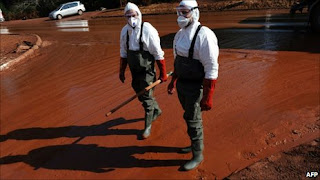The arrest of Zoltan Bakonyi was announced by the PM Viktor Orban.
Mr Orban also said the company would be temporarily nationalised and that those responsible for the disaster should bear the financial consequences.
Eight people have so far died from the 4 October spill near Ajka in the west of the country.
About 150 people were also injured after up to 700,000 cubic metres (24.7m cu ft) of toxic by-product from the production of alumina burst from a storage reservoir.
The residue has covered an area of 40 sq km (15.6 sq miles) and the contamination has spread into the region's waterways.
EU helpEngineers and disaster relief workers, aided by volunteers, have been racing to finish an emergency dam to contain an expected second spill from the reservoir.
Environment State Secretary Zoltan Illes: "2.5 million cubic metres of red mud is pushing that wall"
EU experts are helping the Hungarians with the emergency dam, as well as assessing the longer-term impact of the spill on the ground water and the soil.
They are also examining the potential airborne health hazard posed by the mud drying out.
Speaking to parliament, Prime Minister Orban said those affected by the spill must be compensated, jobs at the alumina plant must be preserved, those responsible for the spill should be held accountable and other potentially hazardous industrial sites must be identified.
He said those responsible for the disaster should bear the financial consequences, not the Hungarian taxpayer.
"We need to hold the company responsible for the red sludge spill under state control and its assets under state closure until all of these four tasks are handled," he said.
He said a state commissioner would take control of the company, MAL Hungarian Aluminium, and manage its assets.
Environment State Secretary Zoltan Illes said the company could face damage claims amounting to 73m euros ($102m; £64m).
"We still don't know for now whether the company overloaded the reservoirs or not," he told journalists in Ajka.
"But if that is the case, it's illegal storage of waste and that constitutes a crime."
Torrent of sludgeThe plant, located about 160km (100 miles) from Budapest, produced alumina - or aluminium oxide - from bauxite ore. Alumina is used to make aluminium metal as well as advanced ceramics.
The by-product of the alumina production is stored in a reservoir near the plant.
The toxic sludge escaped from a breach in the corner of the reservoir on 4 October, sending a torrent as high as 2m (6.5ft) through Kolontar and Devecser and other nearby villages.
Most of those killed were drowned or swept away in Kolontar as the sludge hit. A disaster relief official said on Monday that the body of the last missing person had been found in fields between Kolontar and Devecser.
All life in the Marcal river, which feeds the Danube, is said to have been extinguished.
The sludge reached the Danube on Thursday, but Hungarian officials said on Friday that the pH level in the river was "normal", easing fears that Europe's second-longest river would be significantly polluted.
Emergency crews have been working to dilute the alkaline content of the spill, adding huge quantities of gypsum and chemical fertilisers to the waters of the Marcal and Raba rivers



 Chinese
Chinese Italian
Italian French
French
0 ความคิดเห็น:
แสดงความคิดเห็น